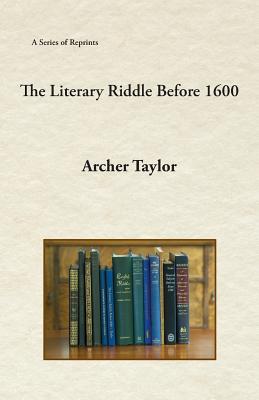" In the study of folklore it is desirable to separate popular or folk materials and literary, learned, or artistic materials. Literary or learned men have often imitated or adapted the various kinds of folklore. Their imitations are rarely intended to deceive and can usually be recognized without difficulty. . . .
"Like the ballad and the tale, the riddle has popular and literary forms. A popular or folk riddle draws attention to the similarity between two wholly unrelated objects by a very simple rhetorical device. . . .
"The literary riddle ordinarily contains a long series of assertions and contradictions and is often put in the form of speech made by the object that is being described. In order to accumulate details enough to permit the listener to guess the answer, the riddler often sacrificed the unity of his conception. The first assumption assertion and its denial are almost certain to conflict with the next pair. Yet the author goes on and on, while his conception becomes more and more incoherent."
Archer Taylor
